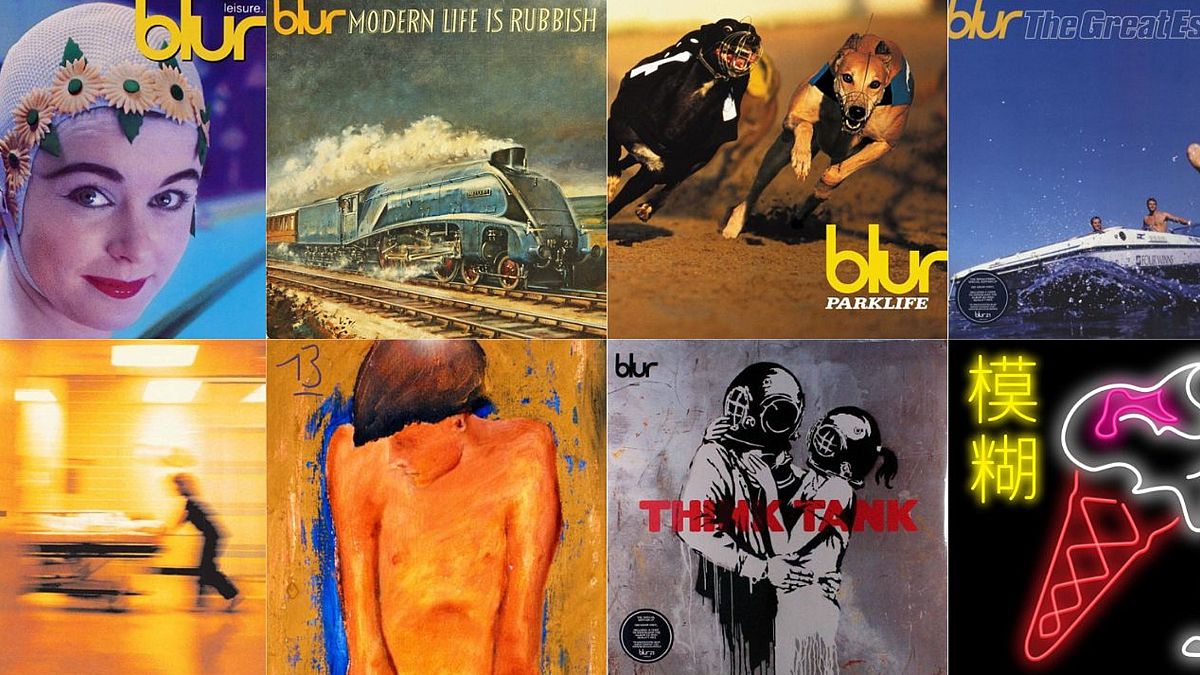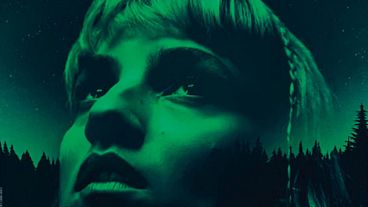The Colchester band have reunited and are releasing their new album on 21 July. Time for Euronews Culture to look back at their discography and do a cheeky ranking...
2023 has seen the reunion of both Pulp and Blur, two 90s Britpop mainstays that defined a musical era.
Earlier this month, the reunited Blur played two shows at Wembley Stadium, as well as perform at several festivals, showing that they’ve still got the goods as one of the most exciting live acts around.
Prior to the release of their eagerly anticipated ninth album, ‘The Ballad of Darren’, only their second since 2003, Euronews Culture revisits and ranks Blur's studio albums, exploring how singer Damon Albarn, guitarist Graham Coxon, bassist Alex James, and drummer Dave Rowntree have managed to weather the Britpop storm and emerge as a band who could never be accused of resting on their laurels.
8) Leisure (1991)
Debut albums usually tend to fall into either one of two categories: fully formed classics that serve as a “we’ve arrived” statement of intent or discardable efforts that the artists go on to dismiss once their discography has bulked up. Blur’s debut 'Leisure' is very much in the latter bracket. It’s not a dud by any means and has some high points (‘There’s No Other Way’, ‘She’s So High’), but it does feel like fairly average ‘90S indie fare, with all the required slacker vibes that haven’t aged too well. When listening to it, you get the impression that this was – quite naturally – a band trying to find its sound and attempting to fit in the then-current landscape of British guitar music, which was at something of a crossroads. Britpop hadn't materialized yet, The Stone Roses were doing their thing and Madchester was just getting going... A confusing time that Blur were trying to navigate. It’s a decent introduction to a promising young band trying to find their footing, but far too baggy to leave a lasting impression, especially compared to the rest of their output.
Key track: ‘There’s No Other Way’
7) The Magic Whip (2015)
Blur’s now penultimate album came after a 12 year break. Damon Albarn was involved in countless solo projects and Gorillaz, and no one was expecting a new album from a band everyone thought was on a permanent break. Their reunion in 2009, followed by live shows in 2012 were extremely promising, as was the release of the single ‘Under The Westway’. Still, fans would have to wait until 2015 for 'The Magic Whip', which wasn’t the comeback everyone hoped for, but still a very consistent release. Inspired by a five-day period stranded in Hong Kong after the cancellation of the 2013 Tokyo Rocks music festival, the band worked on songs that were linked to their surroundings. An interesting jumping off point for a concept album, but the results remain a tad underwhelming. ‘Lonesome Street’ and ‘Ong Ong’ stand out, as does the album’s high point – the beautiful ‘My Terracotta Heart’. Other than that, 'The Magic Whip' was a welcome return but not hugely memorable.
Key track: ‘My Terracotta Heart’
6) Modern Life Is Rubbish (1993)
A bit of a controversial ranking for the band’s second album, as most would place ‘Modern Life is Rubbish’ higher up in Blur’s output. Written after a disappointing US tour that left the band feeling homesick, 'Modern Life Is Rubbish' is a confident release that established the band’s ambitious sound. It was a definite step-up from ‘Leisure’, with the quartet experimenting with different genres – from Smiths-inspired psychedelia (‘Chemical World’) to Kinks homages (‘Star Shaped’) - and establishing Albarn's songwriting knack for portraying working class Britain through vignettes about daily grinds, while injecting a solid dose of romanticism to the proceedings. Many credit this album for birthing Britpop; for that alone, ‘Modern Life is Rubbish’ is to be treasured as a time capsule that kickstarted a genre.
Key track: ‘For Tomorrow’
5) The Great Escape (1995)
Following the commercial and critical success of their third album ‘Parklife’ (more that one in a bit) was always going to be a tough ask. The 1994 release turned Blur into one of the biggest bands of the 90s. Albarn and co were all over the British tabloids, who loved to pit the band against Oasis in the “Battle Of Britpop”, and the pressure was on to convert the try. While many dismiss ‘The Great Escape’ as a poppier 'Parklife Pt.2', the funny storytelling, terrific riffs and catchy tunes are a rather perfect distillation of the band’s sound. Graham Coxon’s guitars have never sounded better, especially when paired with Alex James’ base-line, and the singles ‘Stereotypes’, ‘Charmless Man’ and, of course, ‘Country House’ (the song that lead them to win the charts stand-off against Oasis), all shine. But it’s ‘Mr. Robinson’s Quango’ and ‘The Universal’ which steal the show, proving that Blur weren’t just about enjoyable pop songs. There is a widescreen ambition on show here that proved at the time that Blur were just getting started and weren’t going to live and die with the Britpop movement.
Key track: ‘The Universal’
4) Think Tank (2003)
Another slightly controversial ranking for this undervalued 2003 release. Keeping with the experimental vein the band had tapped with ‘13’ in 1999, ‘Think Tank’ saw the band expanding their horizons and sounding pretty unrecognizable compared to their Brit-popper days. It’s inception was not an easy one: guitarist Graham Coxon had left the band in 2002, leading many to suspect that Blur were done for. However, Albarn, James and Rowntree soldiered on and the three-piece delivered a sombre and often angry record on which the influence of Albarn’s time with Gorillaz, as well as his 'Mali Music' album, could be heard. It’s a loose concept album on what Albarn has described as “love and politics” and yes, it all sounds a bit disjointed - and ‘Crazy Beat’ is one of their most irritating tracks. That said, the experimenting with dance music, rhythmic influences and Afrobeats – alongside production credits from electro artists William Orbit and Fatboy Slim – make 'Think Tank' an overlooked album within Blur’s discography. There’s so much to admire in this wonderfully ambitious record, especially tracks like the minimalist dream of ‘Out of Time’, the dub influences of ‘Brothers and Sisters’ and the hypnotic ‘Battery in Your Leg’. Above all, 'Think Tank' solidified the fact that Blur had truly left the 90s behind and weren’t going to be pigeonholed.
Key track: ‘Out of Time’
3) Blur (1997)
1997 was a key year for the UK music scene. The Britpop bubble burst, popped by Radiohead’s 'Ok Computer'. Everyone was predicting casualties – namely Oasis, Pulp and Blur. To general surprise, that wasn’t the case, as Blur were already bored with the Britpop label they’d been carrying and had begun a pivot to a rockier sound. Graham Coxon stepped up to the plate, along with his love for Pavement, and in stepping away from the zeitgeist, the band expanded its poppier sound. While the album is best known for the 2-minute rock blast ‘Song 2’ and the terrific ‘Beetlebum’, the rest of the self-titled album had plenty to boast: ‘On Your Own’ has a Britpop feel but coupled with a more garage sound and ‘M.O.R.’ has a David Bowie vibe to it that is infectious. This was the sound of a band rethinking their options and embracing a lo-fi US sound that worked wonders. It’s fitting that the cover of the album features a gurney being raced into an emergency room: Blur were darting out of a dying scene that they’d come to define, but the patient was far from on life support.
Key track: ‘Beetlebum’
2) Parklife (1994)
We come to the defining Britpop album, an era-defining effort that encompassed the sound of 90s Britain. Fun and serious at the same time, ‘Parklife’ deals with observations of British life with detailed characters, exploring the quirks of the middle-class folk and working-class heroes with a satirical and often melancholic viewpoint. The Euro-trashy portrait of British youth ‘Girls & Boys’ and the baroque ‘To the End’ are highlights, as well as ‘End of a Century’ - a glorious takedown of British institutions. And then there’s ‘Parklife’, which feels like an encapsulation of the entire Britpop movement – it hasn’t aged brilliantly but remains iconic in its own silly way. There are lulls along the way in this album, and while it’s far from perfect, the highs make it unavoidable and one of Blur’s best. However, the top spot goes to the album that saw Blur refuse to die with Britpop - an album which shows to what extent they have one of indie rock’s most eclectic back catalogues...
Key track: 'End of a Century'
1) 13 (1999)
Britpop was dead and buried by 1999, and Blur’s previous effort, ‘Blur’, had already seen the band move away from the movement. The alt-rock influence worked and was a commercial hit. However, Blur still wanted to innovate and embrace a different sound. The result was ‘13’, a record no one saw coming, due to its experimental sonic shift. It was also heavily influenced by Damon Albarn’s much-publicised split with his partner Justine Frischmann from the band Elastica – meaning that the lyrics and mood of ‘13’ are frequently sombre. Not to say depressing, but the album has an emotional core that is often devastating. The suffocating break-up song ‘No Distance Left To Run’ is counterbalanced by the affecting and more hopeful ‘Tender’, with Albarn’s lyricism shining bright. As for Coxon, who left the band after ‘13’, he took the lead on the anthemic ‘Coffee & TV’, one of the band’s best singles. Then there are tracks like the guitar-heavy ‘Swamp Song’, the trip-hop influenced ‘Battle’ and the Kraftwerk echoing ‘Caramel’, which all felt lightyears away from anything the band had released before. ‘13’ is a poignant, challenging, and sophisticated album, which showed that Blur were the furthest thing from a one-trick pony. It cemented them as one of British music’s most fascinating bands.
Key track: 'Tender'
Blur's ninth album 'The Ballad of Darren’ is released on 21 July.



